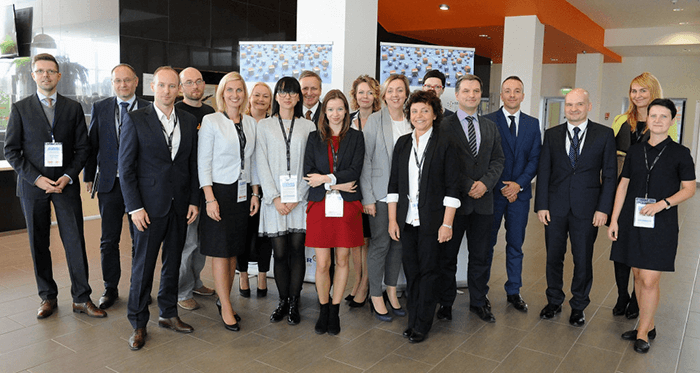I am looking for information as
Researcher

Industry

Patient

Quality on the fast track: BBMRI.pl conference attracts more than 180 participants
The First Scientific and Training Conference of Polish Biobanks took place from 13 to 14 October 2017 at Wroclaw Medical University. The event was organised by the BBMRI.pl Consortium including Wroclaw Medical University, Wroclaw Research Center EIT+, Medical University of Gdansk, University of Lodz, Medical University of Warsaw, Medical University of Lublin, and the Regional Science and Technology Center.
The event attracted more than 180 participants. The discussions focused on the most important aspects related to the Polish Biobanking Network, including biospecimen quality standards, IT solutions, ethical, legal and social aspects of biobanking as well as cooperation between research and industry. Several workshops on how to create a well-functioning repository of biological material were also organised. The conference was organised as a part of the project “Organization of Polish Biobanking Network within the Biobanking and Biomolecular Resources Research Infrastructure BBMRI-ERIC” which is financed by the Ministry of Science and Higher Education of Poland (decision number DIR/WK/2017/01).
The project is based on six main tasks assigned to seven centres forming the BBMRI.pl Consortium. One of them (Task 3) has to do with verifying the Standard Operating Procedures (SOPs) employed by Polish biobanks and biorepositories. As a result, biobanking standards are to be created, while national biobanking centres are to implement common solutions. This task will be carried out by Wroclaw Medical University with a team consisting of the following persons:
Task Coordinator – Agnieszka Matera-Witkiewicz, QMS Expert, Lead Auditor and Trainer – Katarzyna Ferdyn, Two QMS Coordinators, Assistant Auditors and Trainers – Joanna Gleńska-Olender, Małgorzata Witoń and QMS Specialist – Karolina Zagórska.
The conference also included workshops and lectures on biobank quality issues. The lecture presented by Małgorzata Witoń, QMS Coordinator, Assistant Auditor and Trainer, “Quality Management Systems in biobanks and biorepositories” introduced participants to the topic of biological material quality in biomedical research. Guidelines, ISO standards and CEN Technical Specifications as principles for building quality assurance systems at biobanks were used as examples. The Self-Assessment Survey (SAS), a tool created by a team of experts led by BBMRI-ERIC’s Andrea Wutte, EOQ Quality Manager and Auditor, was also presented, followed by a discussion on the SAS filling method and the advantages SAS applications give BBMRI-ERIC. ISO 20387, created to regulate the requirements for quality assurance systems in biobanks, was also presented.
Agnieszka Matera-Witkiewicz, Task 3 Coordinator, gave a short talk related to Wroclaw Medical University biobank resources centralisation. The presentations focused on the key tasks involved, including optimising the storage of biological material dedicated to scientific research, standardisation and uniform conditions for biopreservation and maintaining biospecimens in one central biobank. A number of advantages associated with the university concept were pointed out and include the following: introduction of uniform conditions for the collection and storage of biological material in accordance with unified procedures, fast access to high quality biological material and optimising storage costs (service and validation equipment, processes control, QMS, QC). The centralisation aspect creates considerable opportunities for collaboration within the university as well as cooperation with other stakeholders.
During the second day of the conference, a workshop entitled “Standards for biobanking of biological material for scientific purposes” was held – the first one of this kind addressing such a wide audience. There was also a discussion panel for participants to learn more about the issues mentioned. The workshops were delivered by QMS Expert Katarzyna Ferdyn. Topics included the philosophy behind Total Quality Management (TQM), the cycle of implementation/planning and process improvement (PDCA) and providing a logical and scientific model for continuous improvement of processes.
The QMS Expert also presented an outline of standards for biobanks developed within the scope of the project task and a handbook/manual for internal biobank auditors. The handbook will contain a number of audit questions and examples of documents needed to conduct the audit. Not only Standards but also the Handbook for the Auditor shall facilitate the implementation of the QMS as well as its improvement.
During the workshop, the QMS audit process at biobanks was also discussed. Researchers were encouraged to join the Polish Biobanking Network. A number of benefits were listed, such as QMS audits, QMS implementation and improvement consulting, training and workshops all contributing to increase the scientific potential of Polish biobanks. These aspects will translate into improving the biobank quality and show the stakeholders high quality processes, consequently broader scientific cooperation through registration of the biospecimens collection in the BBMRI-ERIC Directory.
Workshops were evaluated by means of a participant survey. This analysis shall be the basis for improving the training process at BBMRI.pl. Participants actively engaged in discussion with the BBMRI.pl team, emphasising professionalism, the high number of presentations and pointing out the need for further conferences.





